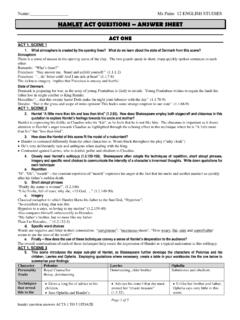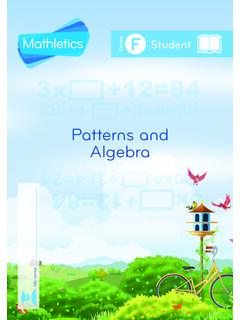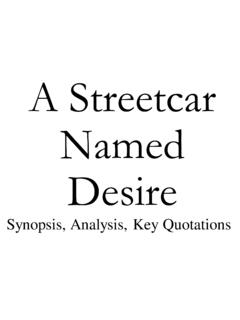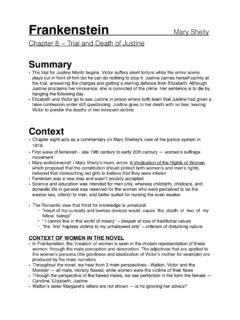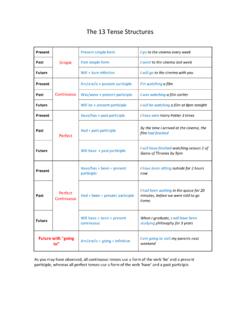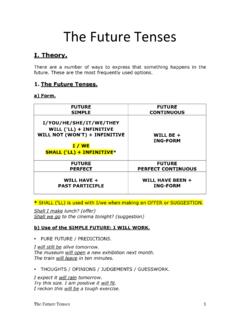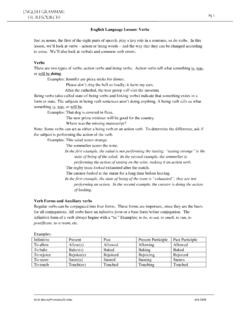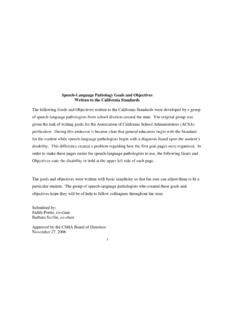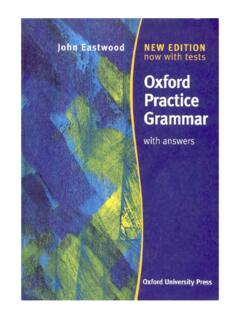Transcription of Participle Clauses
1 Participle Clauses Sentences What happens when two trains or two cars, or two of anything collide? When two cars collide, suddenly there is much less of at least one car. The same happens when two sentences collide there will be parts taken off of one or both of them. Unlike a car collision, in English, this is a good thing. It means we can make our sentences a bit shorter when we try to squeeze two of them together. participles ( past and present) past participles So what is a Participle ? Students often learn past participles (which they call PP) when they learn the present perfect or passive forms.
2 For regular verbs they are the third form of the verb, the ed form. So, what s a past Participle ? When you learn verbs you learn three forms: Go Went Gone (the third is the past Participle in this case gone ). For regular verbs, the past simple and the past Participle take ed and look the same: Stop Stopped Stopped (here the third form stopped is the past Participle ) Irregular verbs, like with the word go above will have a different past Participle : Drink Drank Drunk ( drunk is the past Participle ) If you don t know the forms of the past Participle , they can easily be found in grammar books or online.
3 Look at the three forms and the third form ( past Participle ) below: Know Understand Steal Want Like See Knew Understood Stole Wanted Liked Saw Known Understood Stolen Wanted Liked Seen Which are regular and which are irregular? PRESENT participles Present participles are much easier to deal with. They are simply the ing form of the verb. We use them in the present continuous. They do not change and there is only one form to remember for regular and irregular verbs, simply add ing. Here are some examples of verbs showing the present and past participles (note some of the spelling changes): Infinitive Present Participle past Participle Freeze Freezing (drop final e) Frozen Step Stepping (double p) Stepped Feel Feeling Felt Walk Walking Walked Eat Eating Eaten The Same Subject When two sentences have the same subject, we often can make one shorter sentence with them, using a Participle .
4 Look at the examples below: 1. She was hungry. She stole some bread. (Here we have two short sentences that belong together.) 2. Because she was hungry, she stole some bread. (Here we have put them together with the conjunction because , but the one sentence is longer than the two short ones.) 3. Being hungry, she stole some bread. (In the third sentence we have removed the subject and replaced the past tense verb (was) with the present Participle (being). Being is a Participle clause. It is not always necessary to have the same subject in the two shorter sentences to make a Participle clause, but for now we will use that for the sake of being clear.)
5 Below you will find a discussion on making Participle Clauses without having both subjects the same. In the following few sections, you will see some of the situations where we find Participle Clauses . Because (reason) In the first example, (Being hungry, she stole some bread.) REASON is the situation in which we find this Participle clause. We use the PRESENT Participle for this. Here is a table with more examples. Notice that the reason part of the sentence is the part carrying the Participle clause and the conjunctions so and because are removed because the Participle clause now has the meaning of because (reason).
6 Notice also that a comma is necessary between the Participle clause and the remaining clause. Sentence showing reason Participle Clause He needed money, so he asked his brother for a loan. Needing money, he asked his brother for a loan. Because she was feeling sick, she went home. Feeling sick, she went home. She was a painter, so she decided to open a gallery. Being a painter, she decided to open a gallery. They found it very hot, so they opened a window. Finding it very hot, they opened a window. Because she had a test coming, she spent the weekend studying.
7 Having a test coming, she spent the weekend studying. One thing happens at the same time as another There are times when two things happen at the same time in a continuous way. So often you can make a Participle clause when there are two continuous verbs in the sentence. For example: Present .. She was sitting on the floor and she was crying. She was sitting on the floor, crying. (In this case crying is the entire Participle clause.) Here are more examples of Participle Clauses made to show that two things happen at the same time: He was walking through the park, singing his favourite song.
8 They were looking through old pictures, laughing. The writer was looking at the scene, wondering how he would describe it. She was drinking a cup of tea, looking sadly out the window. One thing happens in the middle of another As you saw in the above example, we can make a Participle clause when two things happen at the same time. We can also make a Participle clause when one things happens in the middle of another thing. For example: .. burned Present ..cooking He burned himself while he was cooking dinner. We can see that cooking dinner went on for some time, and that sometime during that time, he burned himself.
9 The cooking may have taken an hour, where he burned himself in one second, so it is in the middle of cooking dinner. He burned himself, cooking dinner. ( Cooking dinner is the Participle clause here.) Here are more examples of Participle Clauses that possible when one thing happens in the middle of another thing: He was lying on the ground, waiting for the ambulance to arrive. She was biting her fingernails, waiting for the result of her audition. The student was sitting in his room, surfing the internet. The guitarist was strumming a song, making up the words.
10 Replacement of a relative clause (present or past Participle ) A relative clause is another kind of clause (using who, that, which, etc.) Often in a relative clause you can see the present continuous. When both Clauses have the same subject, you can make the relative clause into a Participle clause. The man who is smoking near the door is my doctor. You can see two complete Clauses here: 1. The man is my doctor. 2. who (the man) is smoking near the door. Since the relative clause is in the present perfect (with a present Participle smoking), it can be changed to a Participle clause: The man smoking near the door is my doctor.

